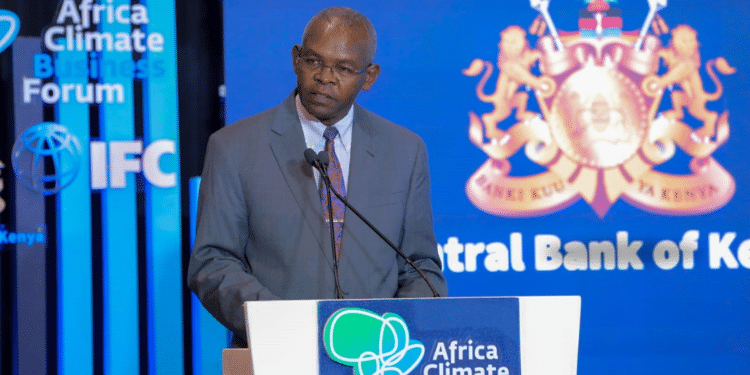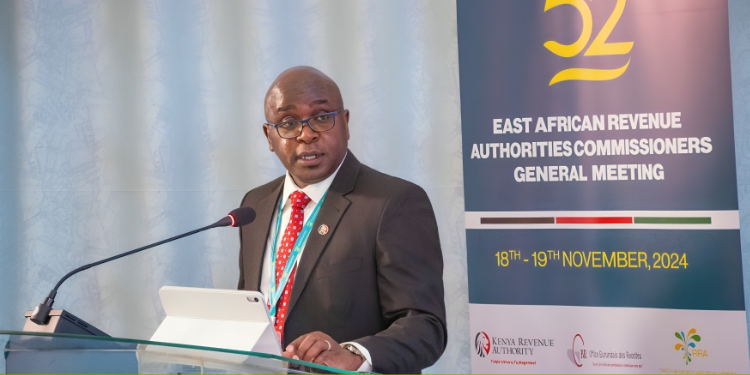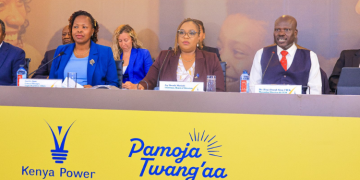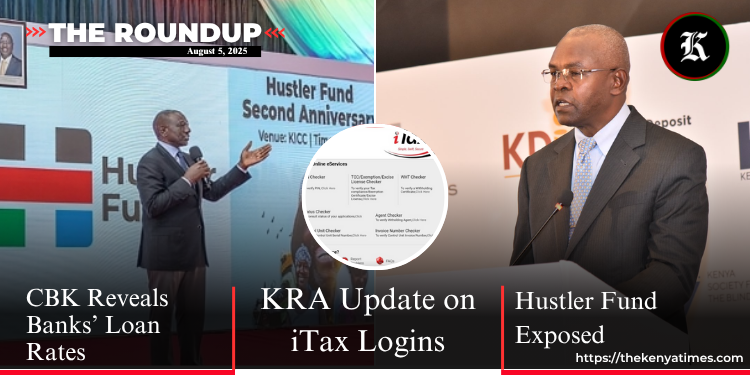Hello, this is Annah. Welcome to today’s edition of The Business Roundup, where we bring you the latest updates on Kenya’s dynamic business landscape. In this edition, we dive into the Central Bank of Kenya’s (CBK) latest data on loan interest rates across all banks in Kenya and explore the key economic trends shaping the nation’s financial future.
CBK has published the interest rates for all banks across the country after it lowered the base lending rates by 25 basis points to 9.75 percent.
According to data shared on Tuesday, August 5, Kenya’s average commercial banks’ lending rate fell to 15.29% in June 2025, down from 15.44% in May.
Subscribe today and stay updated on top news stories in The Kenya Times Business Roundup. The Roundup presents a compilation of business stories that hit headlines throughout the week.
The lowest rates were offered by Citibank (10.60%) and Stanbic (12.20%), while Credit Bank (19.43%) and Access Bank (19.97%) posted the highest.
Citibank was followed by Stanbic Bank Kenya Limited with 12.20%, Ecobank Kenya Limited with 12.90%, and Standard Chartered Bank Kenya Limited with 13.08%.
CBK Reveals Banks with Cheapest and Most Expensive Loans
Guardian Bank Limited’s rate stood at 13.54%, followed by Consolidated Bank of Kenya Limited, which had a lending rate of 13.80%.
According to the notice, the following banks had interest rates between 14% and 15%:
- Paramount Bank Limited- 14.37%
- Habib Bank AG Zurich- 14.61%
- Gulf African Bank Limited- 14.70%
- Equity Bank Kenya Limited- 14.84%
- Bank of India- 14.98%
- Premier Bank Kenya Limited- 15.00%
- Bank of Baroda (Kenya) Limited-15.90%
- Diamond Trust Bank Kenya Limited- 15.15% and ABSA Bank Kenya PLC- 15.29%
- NCBA Bank Kenya PLC- 15.41%
- Prime Bank Limited- 15.44%
- Victoria Commercial Bank PLC- 15.64%
- KCB Bank Kenya Limited- 15.69%
- Guaranty Trust Bank (K) Ltd- 15.74%
- Kingdom Bank Limited- 15.75%
- National Bank of Kenya Limited- 15.87%

Ruto’s Hustler Fund was a Trap for Kenyan Businesses
In other news, a new report by the Kenya Human Rights Commission (KHRC) termed the Hustler Fund, which was President William Ruto’s flagship project, a debt trap.
According to the report launched on Monday, August 4, the fund has failed to deliver economic transformation as promised.
The Fund, launched with much fanfare in 2022, has been put on the spot over poor impact, high defaults, and governance failures.
The fund was designed to offer affordable loans to low-income Kenyans locked out of the formal financial system.
However, nearly two years later, the initiative has been described by rights groups as ‘economically unsustainable,’ ‘politically compromised,’ and a trap for the hustlers it was supposed to uplift.
The report, titled Failing the Hustlers, states that the Hustler Fund has failed to meet its objectives of enterprise development and job creation.
KRA Announces New iTax Login for Kenyans When Filing Returns
And the Kenya Revenue Authority (KRA) introduced a new login option on the iTax platform to allow Kenyan taxpayers to access services using their National Identity Card (ID) numbers.
The move comes in response to increasing public complaints over difficulties accessing iTax during return deadlines.
According to KRA, Kenyans lamented about forgetting or misplacing Personal Identification Numbers (PINs).
“We are simplifying tax processes, enhancing user experience, and promoting a more customer-centric approach to tax administration.
This move is part of an ongoing campaign by the Authority to simplify tax processes, enhance user experience, and promote a more customer-centric approach to tax administration.”
Earlier, users could only log into iTax using their KRA PINs, a requirement that many found difficult, especially during the peak tax filing period.
Billions of Taxpayers’ Money Diverted to Private Accounts via eCitizen
An audit by the Office of the Auditor General has revealed that billions of shillings meant for public services were diverted to private accounts.
The money is collected through unauthorized channels and managed outside of government control via the eCitizen platform, according to the OAG.
The Special Audit Report on Government Digital Payments Platform (eCitizen), released in March 2025, has exposed irregularities in ownership, revenue collection, and oversight of a platform used by millions of Kenyans to access critical government services.
The audit found that money collected via the eCitizen Paybill 222222, the official channel for paying for services like passports, business registration, driver’s licenses, and police clearance, was- in some cases- diverted into an undisclosed private account named ‘pesaflow’, held at Equity Bank.
The East African Community (EAC) on Monday August 4 rolled out the EAC Bond, a new regional customs guarantee designed to replace multiple national bonds currently required to move goods across borders.
The instrument allows traders to secure their entire cargo journey using a single bond, a move expected to significantly reduce the cost of doing business, eliminate delays at border points, and unlock cash previously tied up in deposits.
Legally and digitally anchored under Sections 106 and 107 of the EAC Customs Management Act (2004), the EACBond enables the safe movement of goods under customs control across Partner States without posting multiple bonds.
ALSO BIG THIS WEEK
- The National Youth Opportunities Towards Advancement (NYOTA) Project on Monday, August 4, announced that future communication on application progress will be sent directly to the phone numbers provided during registration, in addition to updates being posted on the project’s official online platforms
- The Kenya Revenue Authority (KRA) has surpassed its betting tax target for the 2024/2025 financial year, collecting Ksh13.233 billion in excise duty from betting services—up from Ksh10.598 billion the previous year.
- National Bank of Kenya, a subsidiary of Access Bank PLC, is shifting to risk-based loan pricing. New loans will adopt the model from 1 Aug 2025, and existing loans from 1 Sep 2025. Pricing will be the National Bank Reference Rate of 12.9% plus a risk premium.
- Kenya has updated its General Procurement Notice for the Horn of Africa Gateway Project, backed by the World Bank. New works include fiber optic cabling, bridge & road construction, trade facilities, weighbridges & axle load control stations in Isiolo–Mandera.
- NCBA Bank has partnered with Mobikey to offer up to 100 percent asset financing for MAN trucks and buses, Randon trailers, and Hyundai construction equipment. The deal targets SMEs and contractors in transport, logistics, and construction.
- UK-listed Marula Mining has partnered with Nairobi’s WEEE Centre to launch a €500K lithium-ion battery recycling project in Kenya. The facility will process used batteries to extract materials like lithium, cobalt, and nickel.
- Kampala International University (KIU) is set to lose its property in Kajiado County after a public auction was announced by Keysian Auctioneers.
- Local corporate entities are taking the lead in Kenya’s equities market, with their share rising to 67.66% in Q2 2025. Meanwhile, the share held by individual investors has dropped significantly to 15.22%.
Currency Trends
The Kenya Shilling remained stable against major international and regional currencies during the week ending July 31.
It exchanged at Ksh 129.24 per US dollar on July 31, compared to Ksh 129.26 per US dollar on July 24.
According to the Q1 statistical figures by the Kenya National Bureau of Statistics (KNBS), the local currency appreciated against the Euro, Pound Sterling, and the US dollar by 16.3, 14.2 and 13.6 per cent, respectively.
Investment analysts at select international financial institutions expect the Kenya shilling to weaken modestly against the US dollar by year-end, citing a narrowing interest rate premium, fiscal risks, and social unrest.
Against other major currencies, the Shilling traded at:
- Sterling Pound – Ksh171.6112
- Euro – Ksh149. 6218
- South African Rand – 7.1643
- Japanese Yen (100 units) – Ksh87.4657
Against regional currencies, the Shilling exchanged at:
- Ugandan Shilling – Ksh27.7015
- Tanzanian Shilling – Ksh19.6928
- Rwandan Franc – Ksh11.1077
Follow our WhatsApp Channel and X Account for real-time news updates.













































































